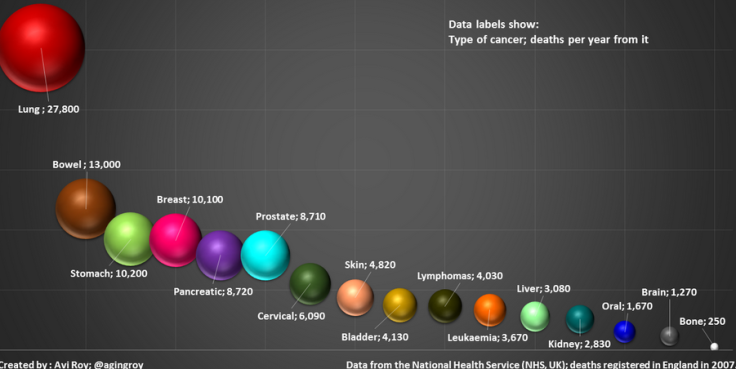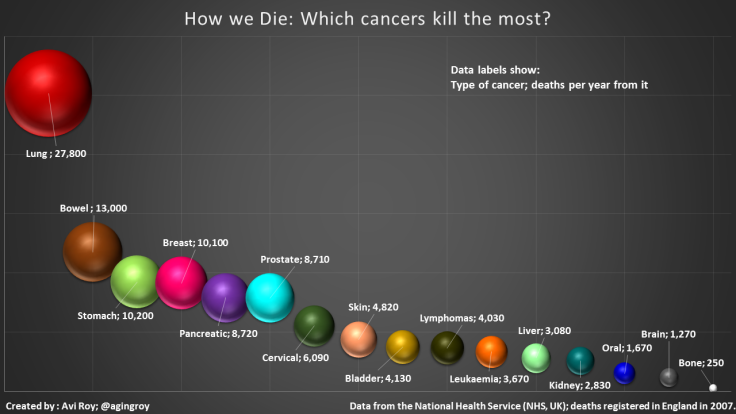Lung Cancer Is Invisible, And Other Reasons The Deadliest Cancers Are So Dangerous

Cancer is the Boogeyman of the adult world. But unlike its fictional counterpart, cancer doesn’t linger in the shadows of children’s bedrooms, but rather the dark corners of our minds. In modern times, we’ve become better at diagnosing and thus treating cancer, but its death tolls are still in the thousands — some forms of cancer taking a considerably larger amount of lives than others. Here is a list of the deadliest cancers and why.
Little Or No Early Symptoms
Lung cancer is cancer's heavyweight champion. According to the American Lung Association, lung cancer takes more lives than pancreas, breast, and colon combined. The reason that lung cancer claims so many lives is that most patients don’t even realize there’s anything wrong until it’s much too late.
The same goes for colon cancer, which is the number two deadliest cancer. According to USC, only about a third of cases are diagnosed in the earliest, most survivable stages.
Breast cancer is the fourth most deadly cancer, according to the UK’s National Health Service. An estimated 10,100 individuals die from this disease each year, even though the cancer is relatively treatable. However, like lung and bowel cancer, the American Cancer Society reports that most breast cancer patients have no early symptoms.
This is why screening tests are so important. The ACA recommends that women aged 40 and older should have a screening mammogram every year. Women in their 20s and 30s should have a clinical breast exam as part of their regular health exam every three years. However, women of all ages are advised to regularly check their own breast for abnormalities.
Other highly deadly cancers showing little to no early symptoms include: pancreatic cancer, prostate cancer, liver cancer, and kidney cancer.
Spread Very Far, Very Fast
While early diagnosis is important for treating all cancers, for some, it’s their rapid spread that makes them truly threatening.
Skin cancer is one of the most treatable of all cancer types, but that doesn’t stop if from taking around 4,820 lives each year. Melanoma is described as the most aggressive form of skin cancer by the ACA. When melanoma spreads to the nearest lymph node to the original tumor, it is able to quickly reach other more distant areas of the body. Once this spread occurs, the cancer is labeled as stage IV, and treatments such as chemotherapy and radiation will most likely be needed.
Leukemia is another one of these quick spreading cancers. Although it starts in the bone marrow, the cancer can quickly spread into the blood. From here, it’s truly limitless and can continue to spread to vital organs, such as the spleen, liver, and lymph nodes. Leukemia is listed as the 11th deadliest cancer and kills an estimated 3,670 individuals each year.
Other cancers known for their rapid spread include, (but of course are not limited to); bladder cancer, lymphoma, and oral cancer.
Difficult to Treat
Other cancers, although detectable and not as quick to spread, are highly dangerous because of how difficult they are to treat. One such cancer is that of the brain. Brain cancer tumors, called glioblastoma, are extremely hard to destroy. Dr. Inder Verma told LiveScience that the cancer often comes back after treatment because “every cell that is left behind has the ability to start all over again.” Although the cancer is relatively rare in the scope of cancers, it does kill around 1,270 people each year.
Stomach cancer is also rather difficult to treat, not because its tumors are incredibly durable, but because there is no specific test for diagnosing the disease. Stomach cancer symptoms include loss of appetite, weight loss, and nausea, all of which can easily be misdiagnosed as another illness. In order to diagnose stomach cancer, a doctor may perform an upper endoscopy, ultrasound, CT scan, MRI, PET scan, and other tests to find abnormalities in the stomach cavity. A biopsy of the cancerous cells will also be done to confirm suspected stomach cancer.
Help Is On The Way
As the case with all cancers, earlier and more accurate diagnosis is intrinsically tied to higher survival rates. A number of companies are working to improve cancer detection technologies. One such company is Vantage Health, which Medical Daily had the opportunity to speak with. The company is working on commercializing a breath sensor that can detect chemical residue associated with certain cancers, allowing health care providers, and eventually even members of the public, to diagnose cancer with a single exhalation.
Allison Swan, currently the corporate development officer at Vantage Health, explained that while the technology is geared toward early lung cancer detection, it’s possible to reach far beyond this scope. Eventually a simple switch of the technology’s application would allow physicians to detect a variety of cancers, including breast and colon.
“Earliest detection is really what we’re working for — not just about cancer, different types of disease, and narcotics on their breath, what prevalence, and all different types (of uses)” Swan said.




























